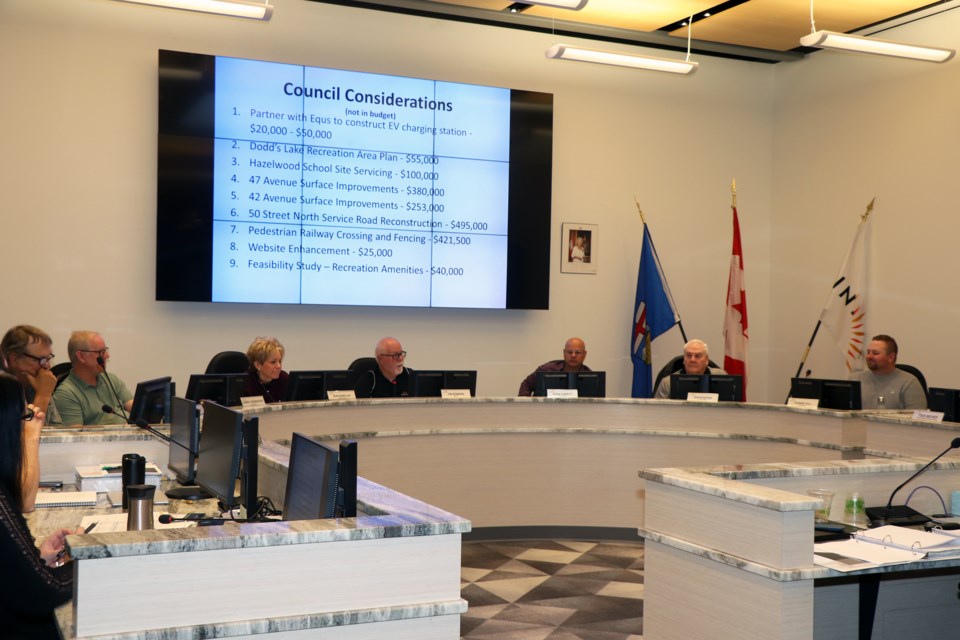INNISFAIL – Local home and business owners are heading for a zero per cent property tax increase for 2020 with only one user fee hike.
That scenario followed two days of council 2020 budget deliberations on Nov. 26 and 27. It was a process leading to council’s final vote on Dec. 9 for the $22-million operating and $4.5-million capital budgets. Council opted during its budget deliberations last year for a one per cent tax increase.
This year’s budget deliberations also saw council keep its promise and commitment to fix the controversial CP rail track issue with a proposed $421,500 budget for a safe pedestrian crossing near the Innisfail Schools Campus.
“It was certainly a budget where we were under more pressure from reduced funding and so it takes more careful thought and for us to just make sure we are trying to be as diligent as we can for our citizens,” said Coun. Gavin Bates, adding he was pleased with where council finally landed.
Coun. Doug Bos added he was happy with the budget process but mostly satisfied a tax raise is not on the table.
“It was a tough budget and with the provincial budget it made it even tougher,” said Bos.
It was a budget process town officials promised to be challenging and one that has to align with recent tough belt-tightening measures introduced this fall by the UCP government’s first provincial budget that saw funding cutbacks for municipal infrastructure projects and social programs.
It was also a process for town council where it had to take serious consideration of the hardship many local citizens are facing due to the struggling provincial economy.
“Raising taxes and increasing user rates in the same budget is very, very, very difficult to sell to the public,” said Heather Whymark, the town’s director of corporate services who presented budget projections during council’s two days of budget deliberations. “That is something I have never done. I either look at the user side or I look at it with a tax increase; never both in the same year. It’s too hard to educate the community why.”
Whymark added that the 2020 budget was not done with just that fiscal year in mind. It was also crafted to take into account the following three predicted challenging years.
“It was really done on the philosophy of what’s to come for the next three to four years for grant funding, what that looks like for the town and do we need to budget in 2020 to look at 2021, 2022 and 2023,” she said. “It has the perception and forecast to be long range planning, yes.”
Even with a zero per cent tax increase projection there is still a possibility some home and business owners could still see a higher tax bill, small as it will almost certainly be. The final tax notices for each local home and business will be known in the spring once final assessment values are completed.
As for council’s direction with other potential costs to homeowners outside the planned zero property tax increase, there is just one hike planned for utility rates and that is for water, which will jump 20 cents per cubic metre and generate about $65,000 for the town’s water reserve account. The town is holding the line on local sewer service rates and there will be no change to the $23 monthly fee for the town’s automated waste collection service.
During Day 2 of deliberations council considered several capital expenditures that were not included in the budget.
Council agreed to move forward on a $35,000 expense to partner with EQUS for the construction of an EV charging station, $55,000 for a Dodd’s Lake Recreation Area Plan, $25,000 for enhancement of the Town of Innisfail website, and an extra $20,000 to the Innisfail Public Library for additional operational expenses.
The largest, however, was the $421,500 for the pedestrian railway crossing and fencing. Council agreed to move forward to have it included in the 2020 budget.
However, construction is not likely to begin until next summer at the earliest. Whymark noted the town will have further detailed discussions with CP rail over rules and regulations for future railway work applications. She said the town is also eyeing an Alberta Transportation grant but can’t apply until next August, or if the town decides to start on its own before making its application.
“It’s great to see there is potentially a grant that we can apply for in August, and I am looking forward to CP coming in and having further discussions about that,” said Coun. Jean Barclay. “I think both provincial government and the railway needs to understand the impact that increased railway traffic is having on our community. I think their needs to be some advocacy in that regard.”
Whymark said after budget deliberations that ongoing discussions are continuing between parties about getting more desirable timelines that would move along the project sooner rather than later.
She is, however, optimistic a satisfactory funding arrangement will happen to have construction begin by next August.
“But we have to look at every avenue we can of other funding,” she said, adding the town could still fund the project itself if the right grant timeliness do not fall in place. “They (council) are committed. It is a priority,” she said.



